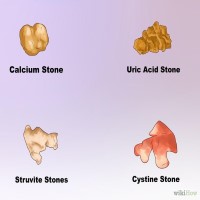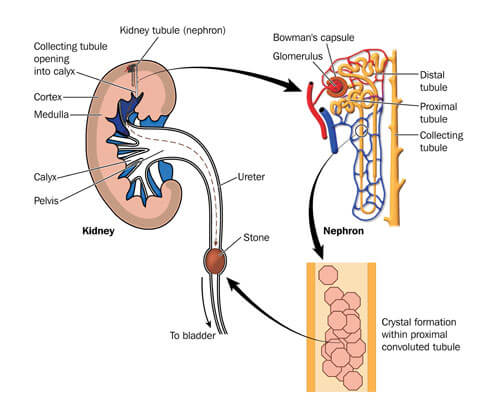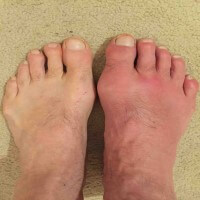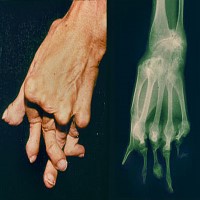Kidney Stones

Kidney stones are small, hard mineral deposits of calcium oxalates and uric acid that form inside the kidneys. These can be found anywhere in the urinary tract. When the urine has a high concentration of minerals, which gets stuck together to form stones. There are no symptoms until the stone moves around and blocks the tubular passages. The concentration of minerals being more than what the fluid component of urine or the lack of substances that prevent crystal formation are two reasons that contribute to stone formation. Most kidney stones are formed of calcium stones, usually in the form of calcium oxalate and phosphates. People who do not drink enough water or are suffering from gout can suffer from uric acid stones.
Ayurvedic Description Of Kidney Stones
In Ayurvedic literature, kidney stones are referred to as Mutrashmari. Mutra means urine and Ashmari means stone. The basic causative factor for Mutrashmari is tridosha aggravation. When Vata is accumulated in the Vasti (urinary bladder), due to its Ruksha guna (dry- rough quality), it stimulates to dry up Mutra, (Urine), Shukra, converted to urine crystals. The Kapha dosha is Guru (dominant), Snigdha (oily), it builds up the crystals together to form stones.
Due to the above factors, the urine gets concentrated and its acidity increases. The reduced quantity of urine leads to increased dryness, sedimentation of salts, obstruction of urine flow and
leading to stones formation. It results in painful urination. Often, it is associated with a burning sensation. As the muscular tone is reduced, fatigue is complained in the localized area, pain is found in the nearby parts like bladder, flanks, back, urethra, etc.
Signs & Symptoms
- Severe pain in lower abdomen and back
- Painful urination
- Scanty urination
- Blood in urine and vomiting
Causes and Risk Factors
1. Diet – Eating food items that increase the formation of calcium oxalate causes kidney stones formation. The fruits and vegetables include are tomato, brinjal, cucumber and guava. The seeds of these have high calcium, which gets deposited in the kidney and causes stones.
2. Low water intake – Low water intake results in a higher concentration of uric acid and salts in the urine. This is a major factor in stone formation.
3. Animal protein – High dietary intake of animal protein puts an individual more at risk of getting kidney stones.
4. Metabolic disorders – An underlying metabolic condition, such as distal renal tubular acidosis, dent’s disease hyperparathyroidism, primary hyperoxaluria or medullary sponge kidney can result in stone formation.
5. Medical condition – People with Crohn’s disease have kidney stones more often than normal individuals.
Self Care Tips
- Watch your water intake, do not let yourself dehydrated, low water consumption assists stones formation.
- Avoid tea, coffee, alcohol, cold drinks, pickles, fish, sour, heavy, and dry food, poultry and meat.
- Eat more fresh fruits and avoid fruit items that have seeds like guava, tomato, and cucumber.
- It is very important to drink at least 2 to 2.5 liters of water per day.
- Eat easily digestible food items like khichdi, daliya, and vegetable soups.
- Strictly avoid the sour, stale food items that can cause a burning sensation while urinating.
- Do not suppress body urges of urinating and defecation.
The Ayurvedic treatment of kidney stones involves the use of herbs that are diuretic and stone dissolving in nature. The treatment of kidney stones has time-tested results that cure the patients without much difficulty and clean the urinary passage.







